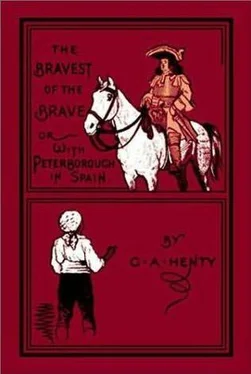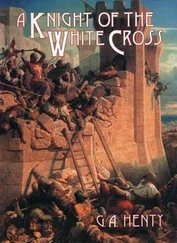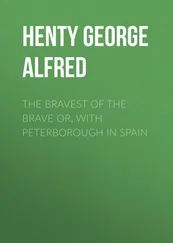At Vinaroz he found that the Spanish troops had already entered Valencia, and that some of the militia of that province and of Catalonia were also in motion to join him. He therefore concentrated his little force at Castillon, to which place he returned as rapidly as he had left it. When it was assembled it consisted of a thousand horse and two thousand infantry, being one English and three Spanish battalions of regulars. Besides these were about three hundred armed peasants, whom the earl thought it better not to join with his army, and therefore quartered them at Almenara.
Although he had accomplished marvels, there was yet much to do. The Duke of Arcos had succeeded the Conde de las Torres in the chief command, the latter having been superseded after his signal failures. The duke had ten thousand men placed under his orders, of whom some thirty-five hundred were in possession of the strong town of Murviedro, which covered the approach to Valencia, while with the main body he marched upon Valencia and commenced the siege of that city. The magistrates, knowing that they could expect but little mercy should the town be taken, made vigorous preparations for defense, and dispatched some messengers to Peterborough imploring him to come to their assistance. He was now in readiness to do so, and on the 1st of February marched from Castillon with his army.
Having unlimited powers, the earl, before starting, presented to his two aides de camp commissions as captains, as a reward for the services they had rendered.
Although so inferior in numbers the little army advanced toward Valencia with an absolute confidence of victory. The successes gained by their leader with a handful of cavalry over an army of seven thousand men had been so astounding that his troops believed him capable of effecting anything that he undertook. They had seen him ride off from San Matteo with his little body of horse upon what seemed an impossible enterprise; they had met him again after having conquered half a province; and if he had accomplished this with such scanty means, what was not possible now when he had three thousand men at his disposal?
But the earl trusted fully as much to his talents in the way of deceiving the enemy as to his power of defeating them by open force in the field. His eccentric genius appeared to revel in the mendacious statements by which he deceived and puzzled both friend and foe; and although the spreading of a certain amount of false news for the purpose of deceiving an enemy has always been considered as a legitimate means of warfare, Peterborough altogether exceeded the usual limits, and appeared to delight in inventing the most complicated falsehoods from the mere love of mischief. At times Jack was completely bewildered by his general, so rapid were the changes of plans, so changeable his purposes, so fantastic and eccentric his bearing and utterances. That his military genius was astonishing no one can for a moment question, but it was the genius rather of a knight errant than of the commander of great armies.
As a partisan leader Peterborough is without a rival in history. Whether he would have succeeded equally well as the commander of great armies he had never an opportunity of proving, but it is more than doubtful. Rapid changes of plan, shifting and uncertain movements, may lead to wonderful successes when but a small body of troops have to be set in motion, but would cause endless confusion and embarrassment with a large army, which can only move in accordance with settled plans and deliberate purpose.
It must be said, however, that this most eccentric of generals proved upon many occasions, as at the siege of Barcelona, that he was capable of adapting himself to circumstances, and it is possible that had he ever been placed in command of a great army he would have laid aside his flightiness and eccentricity, his love for theatrical strokes and hair breadth adventures, and would have exhibited a steadfast military genius which would have placed his name in the annals of British history on a par with those of Wellington and Marlborough. Never did he exhibit his faculty for ingenious falsehood more remarkably than at Murviedro, where, indeed, a great proportion of his inventions appear to have been prompted rather by a spirit of malice than by any military necessity.
Murviedro was the Saguntum of the Romans, one of the strongest cities in Spain. The force there was commanded by Brigadier General Mahony, an officer of Irish descent. He had under him five hundred regular cavalry and a battalion of eight hundred trained infantry; the rest of his force consisted of Spanish militia. The town itself was fairly strong and contained a large population. It was separated from a wide plain by a river, on the banks of which redoubts mounted with artillery had been thrown up.
Here the Valencian road wound through a pass, above which, on the crest of a lofty overhanging hill, were the ruins of ancient Saguntum. Peterborough had no artillery save a few Spanish field guns; the enemy's position was formidable both by formation and art, and his force was altogether inadequate for an attack upon it. So hopeless did the attempt appear to be that Peterborough's officers were unanimous in the opinion that it would be better to make a wide circuit and avoid the place, and to march directly upon Valencia and give battle to the Duke of Arcos under its walls. Peterborough, however, simply told them to wait and see what would come of it, and in the mean time he continued to bewilder his foes by the most surprising romances.
His agents were for the most part a few sharp witted dragoons, and some peasants whose fidelity was secured by their families being held as hostages. He had already contrived to bewilder the division of Las Torres before it reached the main body under the Duke of Arcos. A spy in his pay had informed the Spanish general that the British were close upon him, and he had accordingly at once broken up his camp and marched all night.
In the morning the spy again presented himself and stated that the British were pushing on over the mountains to his left to occupy an important point and to cut off his retreat to the Valencian plains. As it seemed absolutely impossible that they could have pressed forward so quickly, Las Torres refused to credit the story. The spy, as if indignant at his truth being doubted, pledged himself at the hazard of his life to give proof of the assertion to any officer who might be sent to ascertain it.
Two officers in plain clothes were accordingly sent with him in the direction where he stated the English to be; but when they stopped for refreshment at a village on the way they were suddenly pounced upon by a picket of English dragoons, who had been sent there for the purpose. After a time the spy pretended to the two officers that he had made the guard drunk and that they could now make their escape, and leading them stealthily to the stable showed them two of the dragoons lying in an apparently drunken sleep. Three horses were quietly led out of the stable, and the three men rode off, some of the dragoons making a show of pursuit.
This incident, of course, established the credit of the spy. Las Torres was convinced that his retreat was really threatened, and hurried on again with all speed, while all this time the English army was really many miles away near Murviedro. Other dragoons were induced to feign desertion, while some permitted themselves to be taken prisoners, and as each vied with the others in the extravagance of his false information, the Spanish generals were utterly bewildered by the contradictory nature of the lies that reached them.
While Las Torres was hastening away at full speed to join the Duke of Arcos, Peterborough was occupied in fooling Mahony. That officer was a distant relation of Lady Peterborough, and the earl sent to demand an interview with him, naming a small hill near the town for the purpose. When the time for the interview approached the earl disposed his army so as to magnify their numbers as much as possible. Some were posted as near the town as they could venture along the pass; others were kept marching on the lower slopes of the hills, their numbers increased in appearance by masses of the armed peasantry being mingled with them.
Читать дальше












